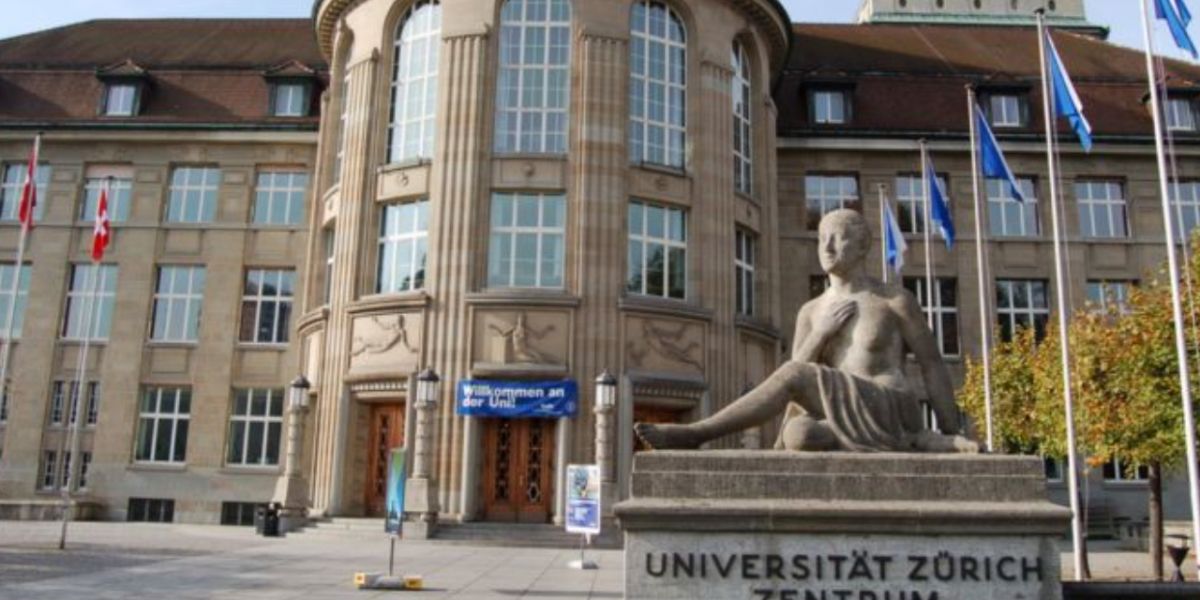
Zurich is famous for its high-quality higher education and outstanding research centers. For instance, ETH Zurich, which has produced several Nobel Prize winners, including Albert Einstein, is highly regarded. The University of Zurich (UZH) also has an excellent reputation, drawing nearly 20% of its students from abroad. Both institutions are listed among the top 100 universities in the QS World University Rankings. Here's an overview of Zurich's universities and their key features.
The University of Zurich (UZH)
Founded in 1833, the University of Zurich (UZH) is Switzerland's largest university, with over 25,000 students, 20% of whom are from abroad.
UZH is also a leading research institution featuring 7 departments, 150 institutes, and over 200 undergraduate and master's programs.
The university's departments cover a wide range of fields, including theology, law, economics, computer science, medicine, science, arts, and social sciences.
Admission procedures for foreign students
As an international student, you can study at Zurich universities through the Swiss-European Mobility Exchange Program.
Funded by the Swiss government, this program is available to all students wishing to study at a Swiss university, covering bachelor's and master's students. The program lasts up to 12 months per study cycle (Bachelor's, Master's, or PhD).
Students receive a grant of CHF 1,600 per semester (CHF 400 per month) for the duration of their exchange, which can be one or two semesters. Participants remain enrolled at their home university and do not need to pay tuition fees to the Swiss university.
If you're not participating in an exchange program, you can apply directly to the Swiss university of your choice. Check the university's website for application deadlines and a complete list of required documents.
For instance, at the University of Zurich, applications for the September semester open on January 1 of the same year.
Students requiring a visa to enroll in a university in Zurich must apply within 2 months (i.e., by February 28). Others have a little more time.
The documents usually required are:
- Application form;
- Copies of diplomas and transcripts;
- Curriculum vitae (CV);
- A cover letter;
- Proof of language proficiency, particularly in German if your course of study is in this language;
- Proof of funds;
- Passport-size photos.
UZH partnerships with other schools and universities
The University of Zurich (UZH) has around 460 exchange agreements across 50 disciplines with over 200 partner universities throughout Europe.
Some of these European partners include Ludwig Maximilian University of Munich (LMU) in Germany, the University College London (UCL) in the UK, Université Paris-Saclay in France, the University of Milan in Italy, the University of Vienna in Austria, and the University of Copenhagen in Denmark.
In addition to its European connections, UZH also has partnerships with American universities and other national institutions such as ETH and ZFH (see the presentations below).
Eidgenössische Technische Hochschule Zurich (ETH Zurich)
Established in 1855, ETH Zurich is a prestigious technical university renowned as the alma mater of Albert Einstein. It is ranked second in the QS ranking among European universities, following Oxford, and holds the 7th position globally.
The university has produced numerous Nobel Prize and Fields Medal winners, underscoring its excellence in research.
With over a third of its student body from international backgrounds, ETH is recognized as one of the most diverse universities worldwide. Master's and PhD programs are conducted in English, while bachelor's programs are primarily taught in German, which aligns with the language of instruction at most universities in Zurich.
ETH's key areas of study include architecture and civil engineering, engineering sciences, natural sciences and mathematics, system-oriented natural sciences, and management and social sciences.
Additionally, 16 doctoral programs are offered jointly by ETH Zurich and the University of Zurich.
Good to know:
The school is divided into two campuses, one located in Zurich's historic district and the other in Hönggerberg, on the outskirts of the city. Students can access both campuses by shuttle buses.
Admission procedures for international students and partnerships
As with UZH, it is possible to study at ETH through an exchange program or by applying directly.
Good to know:
Application deadlines are set for each semester. Check out the calendar directly on the ETH website.
ETH has partnerships with almost a hundred other universities worldwide, including in Europe: Imperial College London, UK; Technische Universität München (TUM), Germany; École Polytechnique Fédérale de Lausanne (EPFL), Switzerland; KTH Royal Institute of Technology, Sweden; Politecnico di Milano, Italy.
Zürcher Fachhochschule (ZFH)
The Zürcher Fachhochschule (ZFH) consists of three public universities and one affiliated private university, the University of Applied Sciences in Business Administration (HWZ). The ZFH provides practical education and has a combined student body of nearly 20,000 students.
Zurich University of Applied Sciences (ZHAW)
Established in 2007, Zurich University of Applied Sciences (ZHAW) is among Switzerland's most prominent universities of applied sciences. It provides a range of practical programs in areas like engineering, computer science, health sciences, economics, design, and management.
ZHAW is known for its focus on applying research and teaching in real-world contexts.
Zurich University of the Arts (ZHdK)
Established in 2007, the Zurich University of the Arts (ZHdK) is a prominent art school in Europe. It provides a diverse range of programs in fine art, design, theater, music, dance, film, and media.
Through its performances, exhibitions, presentations, and the Design Museum (Museum für Gestaltung) with its collections, ZHdK significantly contributes to the cultural landscape of Zurich and its canton. The university offers various study and research programs to approximately 2,100 bachelor's and master's students.
Pädagogische Hochschule Zürich (PHZH)
Established in 2001, the Pädagogische Hochschule Zürich (PHZH) is a university specializing in pedagogy and education, providing teacher training and research programs for primary and secondary education. Additionally, it offers continuing education courses.
With an annual intake of approximately 3,600 students and 12,000 participants in continuing education programs, PHZH plays a vital role in preparing future educators and advancing educational research.
University of Applied Sciences in Business Administration (HWZ)
The University of Applied Sciences in Business Administration (HWZ) is part of the ZFH Group but operates as a private institution. Serving more than 2,500 students, HWZ provides continuing education programs that can be pursued alongside employment in areas such as business economics, communications, and business informatics/business engineering.
Tuition fees at Zurich universities
Below is a summary of tuition fees at universities in Zurich. The standard tuition fee is approximately CHF 720 per semester. In addition to this, there are other expenses to consider, for example, application fees.
Here is a detailed example of the various fees mentioned by the ZHDK, revealing what is commonly practiced at different universities:
- Application fee: CHF 100;
- Entrance exam (if applicable): CHF 200;
- Tuition per semester: CHF 720;
- Semester fee for the Zurich Sports Association (ASVZ): CHF 35;
- Semester fee (optional) for student union associations: CHF 32.
Please be aware that many universities impose an extra tuition fee on international students, typically amounting to CHF 500 per semester.
Tuition fees for PhD programs can vary, so it is advisable to consult the respective university's website for specific details. For instance, the University of Zurich charges CHF 150 per semester for PhD studies, while ETH Zurich applies a flat fee of CHF 730 per semester for all students, regardless of nationality.
The above information concerns tuition fees only. What is the overall cost of living for a student in Zurich?
The cost of living for international students in Zurich
Several universities have simulated student fees on their websites, estimating, on average, a monthly budget of CHF 2,000 for international students in Zurich.
Here are the details of the monthly cost estimate produced by the ZHDK mentioned above:
- Study fees (tuition + materials): CHF 315;
- General expenses (health insurance + travel): CHF 240;
- Living expenses (rent + food): CHF 1,150;
- Personal expenses (telephone subscription, clothing, hairdressing, etc.): CHF 250;
- Other occasional expenses (medication, optician, etc.): CHF 60.
Total monthly expenses: 2015 CHF
Scholarships for international students in Zurich
Depending on the institution you attend, scholarships based on financial need or academic merit may be available. However, in practice, only a small number of bachelor's and master's students receive scholarships. Many students fund their studies by working part-time. However, here are the possibilities for obtaining a scholarship in Zurich as an international student:
Exchange students
Consider exploring scholarship opportunities offered by your home university or through the Swiss-European Mobility Program. Typically, grants are around CHF 400 per month. Contact the appropriate office at your home university to learn more about eligibility criteria, application deadlines, required documents, and other details.
Government scholarships
The Swiss government provides scholarships for international students in research and the arts. For detailed information on the available scholarships and their requirements, please visit the website of the Federal Commission for Scholarships for Foreign Students (FCS).
The Swiss National Science Foundation
The Swiss National Science Foundation (SNSF) supports research across various academic fields, from sociology to medicine and engineering. Annually, the SNSF finances more than 1,500 research projects. Their most recent monthly report reveals that 45.3 million Swiss francs were designated for 405 grants, supporting young researchers in pursuing international experiences.
Obtaining a visa to study in Switzerland
Students from the European Union (EU)/European Free Trade Association (EFTA)
You do not require a visa to study in Switzerland in this scenario. Nevertheless, it is essential to register with the Residency Registration Office (Einwohnerkontrolle) at your new address within 14 days of arriving in Switzerland. Subsequently, you will need to apply for a residence permit (distinct from a visa).
Students from Australia, Brunei, Japan, Malaysia, New Zealand, Singapore, the United Kingdom, and the United States may enter Switzerland without a visa. However, you must apply for a residence permit like EU and EFTA students.
Students from non-EU/EFTA countries holding a valid and recognized travel document
You do not require a visa to enter Switzerland if you possess a valid residence permit from a Schengen country or a D visa valid within this zone.
Other nationalities
Students who do not fall under the previous categories must apply for a D visa from the Swiss embassy or consulate in their country of residence before entering Switzerland.
In addition to standard documents like a passport, you will be required to show proof of enrollment at a Swiss higher education institution. Depending on your nationality, certain embassies or consulates may also request evidence of your financial means to support yourself in Switzerland, such as a bank statement.
For specific details on the necessary supporting documents, please refer to the website of the Swiss representation in your country of origin.
We do our best to provide accurate and up to date information. However, if you have noticed any inaccuracies in this article, please let us know in the comments section below.








